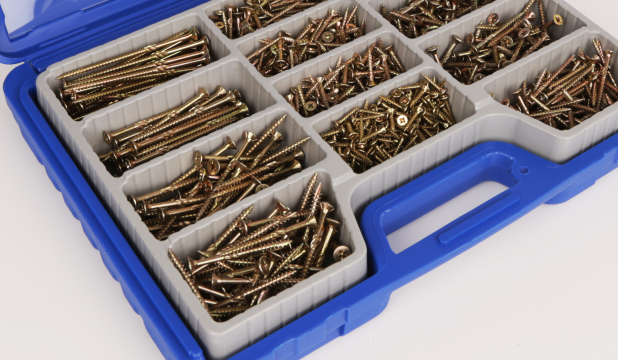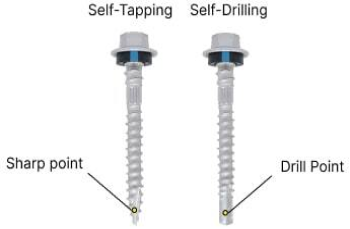Intro
Choosing the right screw for the job is essential for protecting the material you’re joining, however, with a myriad of screws to choose from and the differences between them inconspicuous to the untrained eye, ensuring you pick out the right one can seem like a daunting task. In this guide, the basics of screws will be explained, including the main types of screws, the materials they’ve been designed to work best with and what materials they’re made from, all in hopes to help you identify the best screw to hold fast your masonry… or achieve a neat finish for your indoor DIY project!.
If you need help dissecting what different threads, heads and gauges do, take a look through our other Screw guide pages:
Screw Anatomy
Before we take a look at the different types of screws, it's a good idea to get acquainted with their different parts first:

Types of Screws
Self-tapping and Self-drilling Screws
Common Materials
Most screws offer a certain level of resistance to the elements. However, if you’re tackling an outdoor project, you’re going to need a type of screw that are specifically designed to resist corrosion, or else it will become rusty, liable to break, and can cause issues further down the line.
The type of screw doesn’t necessarily determine whether it’s suitable to be used on an outdoor project, instead, it is what the screw is made from. There are exceptions to this rule, such as decking screws, which by default are made from stainless steel and will always be an optimal choice for exterior jobs. There are also screws that are specifically designed for interior jobs and wouldn’t fare well outdoors, such as drylining screws.
Plain Finish Screws
These types of screws have no coating or finish. Typically, screws which have not been coated will not fare well outside and should be avoided for external use, unless they are naturally corrosion-resistant:
- Steel Screws: These screws have generally been coated in an oil-coating, which will increase their shelf life but is not effective corrosion protection.
- Stainless Steel Screws: Ordinary steel is not corrosion-resistant in the same way as its stainless steel counterpart, which is far more long-lasting and less brittle.
- Brass Screws: Brass screws will not be coated as the material should have sufficient corrosion resistance as it is. These screws are used frequently in the marine industry and are capable of withstanding constant exposure to saltwater.
- Non-metallic Screws: Screws created from materials such as plastic, PTFE, ceramic and fibreglass won’t melt, rust, seize or became brittle - even at extreme temperatures. They are non-conductive and resistant to corrosive gases.
 Tip: Although stainless steel is good for corrosion resistance, they are a little softer than other screws, so go easy on the power tools!
Tip: Although stainless steel is good for corrosion resistance, they are a little softer than other screws, so go easy on the power tools!
Corrosive Protection Coatings for Screws
If you’re looking for exterior screws that can handle the elements and promise durability, these are the most common types of coating to look out for:
- Zinc Plating: Applied mechanically or using electroplating, this is one of the cheapest and most effective corrosion-protecting coatings for screws. To provide even further protection, a chemical passivation is applied to the zinc coating, giving it a yellow tinge and a harder surface.
- Galvanised: This is another form of zinc plating, where the screws are dipped in molten zinc and then spun to ensure an even coating across the whole surface. They are especially good for use on treated lumber, which can rust normal screws. They are more effective than an electroplated finish but they are more often found on nails than screws. A galvanised finish is often wax-coated to ensure the fixing is easier to insert.
 Tip: Zinc screws that have been passivated are often abbreviated to “ZYP” or “Zinc & Yellow Passivated”.
Tip: Zinc screws that have been passivated are often abbreviated to “ZYP” or “Zinc & Yellow Passivated”.
Decorative and Secondary Coatings
Screws are often coated in order to improve their decorative appearance whilst remaining corrosion-resistant. Here are some of the most common decorative finishes used in household applications:
- Brass Electro Base: This is a brass finish that is applied by electroplating.
- Black Japanned Screws: These screws are coated with a black enamel which can be used in black fittings and will provide corrosion resistance.
- Chrome Screws: These screws have been electroplated with chrome and provide a very hard, highly shiny surface. They are particularly useful for bathrooms or where there is likely to be a high level of condensation.
 Tip: It’s possible to electroplate screws with a range of metals depending on what finish you’re after; tin, bronze, nickel, copper and a range of oxidised ‘antique’ finishes can be found if you’re looking for something more unusual.
Tip: It’s possible to electroplate screws with a range of metals depending on what finish you’re after; tin, bronze, nickel, copper and a range of oxidised ‘antique’ finishes can be found if you’re looking for something more unusual.



